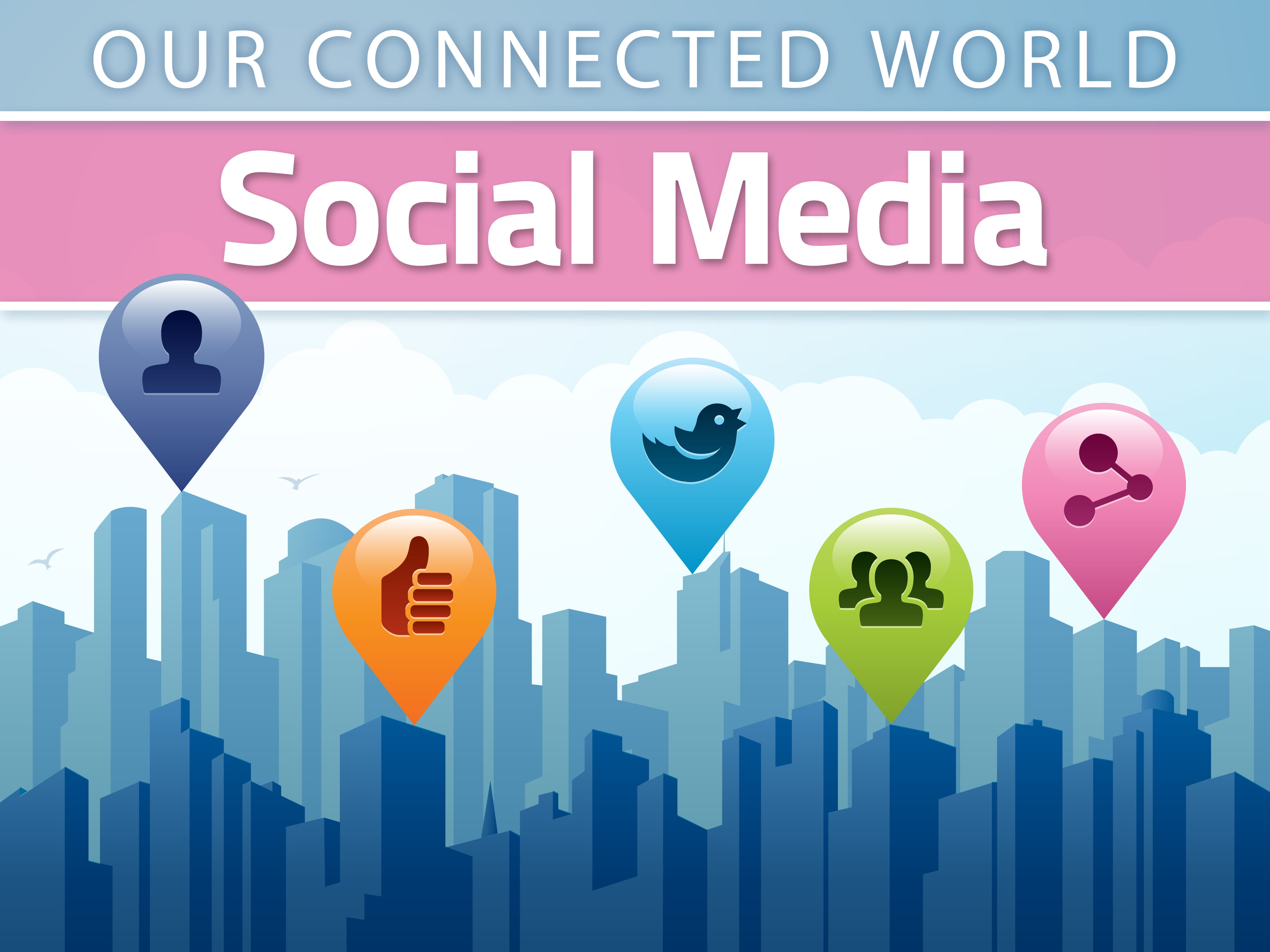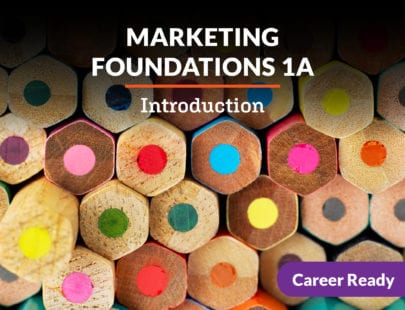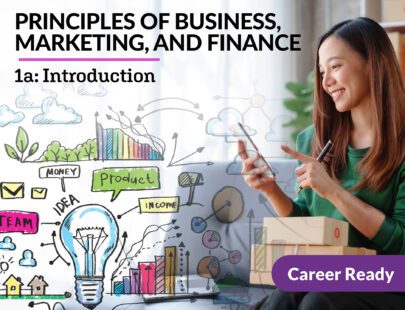
Social Media: Our Connected World
Do you have any social media accounts? Learn the ins and outs of such social media platforms as Facebook, Twitter, Pinterest, Google+, and more and how to use them for your benefit personally, academically, and, eventually, professionally. If you thought social media platforms were just a place to keep track of friends and share personal photos, this course will show you how to use these resources in much more powerful ways.
Units at a Glance
Unit 1: Social Media Past and Present
Have you ever met someone who thought social media was nothing more than people sharing cute photos and memes with their friends? We all have—but we know better! In reality, social media has grown into one of the most impactful elements of 21st-century life. Although Facebook may be the best-known social media network, it doesn’t define the field. Social media is an ever-growing technology that has evolved into a means for personal and professional communication; it has grown to encompass several solid platforms and tools, each of which gets millions of daily visitors. Social media is everywhere in our lives today and has changed our habits and ways of communicating.
What will you learn in this unit?
- Define social media
- Identify various types of social media
- Outline the steps in the rise of social media popularity
- Explain how social media and the hardware we use to access it have changed over time
Unit 2: A Closer Look at Social Media Platforms
Social media platforms have become so beneficial, and so important, to our daily life that terms like “hashtag” and “unfriended” have been added to the Oxford English Dictionary. We’ll analyze some of the most visited social media networks, learn how they evolved, understand how to use them and for what purposes, and identify some strategies for leveraging them securely and effectively.
What will you learn in this unit?
- Understand how social media usage fulfills basic human needs
- Analyze the history of various social media platforms
- Investigate how to navigate social media platforms
- Discover how to make use of social media security features
Unit 3: Digital Citizenship and Personal Relationships
When was the last time you brought a tangible photo album over to a friend’s house to show off some new pictures? It’s probably been quite a while ago (if ever), right? This once commonplace activity has been replaced by virtual sharing via social media platforms. Photos aren’t the only things we’re sharing online, though. Status updates, videos, articles we’ve read—these are all things that we can now broadcast to the world with the click of a button. Does this ease of use make for better interpersonal communication, or is social media ruining the natural way we humans have communicated with each other for centuries? Big questions deserve big answers. Let’s dig in.
What will you learn in this unit?
- Explain why social media is a popular form of personal interaction and identify best practices for using it ethically and safely
- Utilize the features of Facebook and Instagram designed for interpersonal communication
- Effectively use the features of Twitter designed for interpersonal communication
- Describe best practices for using social media as a source of news
Unit 4: Social Media for Students
We know, we know—no electronics until your homework is done! But wait. Social media can actually help us learn—when we know where to look. Professors, researchers, scientists, doctors, writers, and activists have all realized the immense power of social media for disseminating information broadly and quickly. If you know where to search, you can find a wealth of scholarly information by searching your favorite social media sites.
What will you learn in this unit?
- Explain how Facebook can be used to collaborate with fellow students and team members
- Describe how to use Twitter for research, including locating sources, following experts, communicating with colleagues, and learning about current trends in a given field of study
- Identify and evaluate YouTube videos for their educational value
- Identify and evaluate the usefulness of blogging as a tool for learning
Unit 5: Social Media and Professional Networking
Congratulations—you graduated! (Don’t worry—it will happen sooner than you know). Now what? Previously we’ve discussed how to use social media to your benefit during the course of your academic career. But social media can also prepare you for the workforce as your academic career winds down and your professional career begins. Whether you create new social media accounts solely focused on career goals or you review and revise the accounts you already have to make them appropriately professional, you’ll learn that these platforms can help you post resumes, find jobs, network with other professionals, get answers to your questions, and stay on top of industry trends in the career of your choice.
What will you learn in this unit?
- Describe how social media can benefit your professional career
- Utilize LinkedIn to find jobs, make professional connections, and learn more about your career
- Use Twitter to learn from other professionals and stay informed about trends in your industry
- Analyze and evaluate how to make responsible decisions about using Facebook for personal communication vs. professional goals
Unit 6: Developing a Personal Brand
Quick! Describe yourself in two words. Tough, isn’t it? When you build a brand, you have only seconds to define yourself to your audience. And whether we are unaware or do so consciously, whenever we use social media we are creating and broadcasting a personal brand by the way we represent ourselves when looking for jobs or communicating with colleagues and clients. It’s important to be aware of your personal brand and to build it carefully and thoughtfully.
What will you learn in this unit?
- Discuss the importance of building an online personal brand
- Analyze effective brand models to create your personal brand
- Use a blogging platform to create brand persona
- Recount a brief history of social media marketing
Unit 7: Social Media Marketing
Can you believe it? The same social media strategies used by Fortune 500 companies are also available to you for promoting your personal brand or for promoting the products and services of your company. We’ve spent some time discussing the significant role social media now plays in marketing and looking at how popular brands leverage these platforms to gain exposure; to promote their products, services, and brand values; to attract new customers; and to retain their existing ones. In order to use these tools effectively, you need to know which affordances each platform offers and then create a custom marketing strategy for each platform.
What will you learn in this unit?
- Describe how Facebook can be used for marketing and use the platform’s tools to promote brand values, products, and services
- Illustrate ways to use Instagram for marketing and use the platform’s tools to promote brand values, products, and services
- Articulate ways to use Twitter for marketing and use the platform’s tools to promote brand values, products, and services
- Define ways that YouTube and Pinterest can be used for marketing and use the platforms’ tools to promote brand values, products, and services
Unit 8: Thinking Critically About Social Media
Perhaps more than any other invention in the 21st century, social media has impacted the way we live, work, and play. Simply put, social media has changed how we interact with our world. While there are numerous benefits to this way of communicating, it is worthwhile to consider the challenges we face when interacting with social media. Doing so will make us more intentional and therefore more effective users of social media and potentially help us avoid some dangerous pitfalls. It’s worth your time to ponder both the benefits and drawbacks of your social media life, to monitor your habits, and to set some goals for your future social media interactions.
What will you learn in this unit?
- Describe how social media benefits us individually and as a society
- Identify drawbacks of social media
- Create goals and a best practices plan for your future personal and professional use of social media
- Consider future trends in social media
Required Materials
Physical
- Tablet, laptop, or phone
- Audio recording device like a cell phone
Software
- Word processing software
- Graphic design program like Google Slides or Canva
Other
- Google account/access to Blogger
- Facebook or Twitter account
- Instagram account



